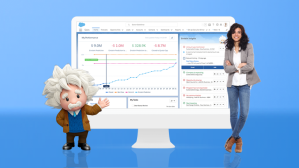With inputs by Alekhya Bodingari, Lead Solution Engineer, and Shantesh Akerkar, Lead Solution Engineer.
Sales as a business function is undergoing an accelerated transformation. Thanks to technological innovation, customers now expect personalised engagements and recommendations from sales representatives. The burgeoning role of sales in customer experience is no more a secret. But to rise to these new responsibilities, sales reps need deep insights into customer expectations to make effective decisions throughout the sales pipeline.
The use of artificial intelligence (AI) tools in decision-making helps sales teams take prompt, accurate, and insights-based decisions, transforming their engagement with prospects and customers. Here’s how AI tools support effective decision-making in the field of sales:
1. Better lead prioritisation for improved conversion rates
Lead and behavioural scoring is about predicting the leads that are most likely to convert. Several factors go into building a lead scoring model, such as:
- Behavioural analysis: Understanding how potential buyers are interacting with a company is critical to lead conversion. For instance, someone visiting your pricing page is more interested in your products than someone who visits your home page and bounces back.
- Company information: For a B2B enterprise, factors such as the annual revenue or any recent mergers and acquisitions (M&A) of its leads are important parameters for lead scoring.
- Engagement: The level and frequency of engagement shown by a lead for your content is also an indicator of their interest in your products. For example, someone subscribing to your newsletter is keen on engaging with you.
As customer journeys become more fragmented, and the volume of unstructured data rises, it can be easy to miss vital pieces of information. The use of AI tools can fine-tune lead scoring models such that the ‘hot leads’ are at the top of the pipeline. Besides, AI algorithms can continuously analyse consumer behaviour and adjust lead scoring criteria as the markets change.
Effective lead scoring accelerates an enterprise’s sales pipeline, helping reps close more leads faster.
2. Personalisation of sales strategy
Knowing when to reach out to a prospect and with what value proposition is just as important as who you are reaching out to. Historically, sales reps have relied on their experience and instinct to engage with prospects. But when sales reps use AI tools in sales, they rely on customer data to suggest a strategy.
Even unstructured data such as emails, social media posts, and minutes of a sales meeting can point to customer sentiment. When combined with factors such as a prospect’s annual revenue, territory, competitor involvement, and seniority of decision-makers involved, AI tools like Einstein Account Insights and Einstein Opportunity Insights can suggest the best path forward for sales reps.
3. Better insights with automated data capture
Most customer relationship management (CRM) software are good at collecting structured data. But when it comes to unstructured data such as activity-data (emails, calendar events, minutes of meetings), CRMs often fail to capture it efficiently. Since activity data is also immensely useful for extracting customer insights, sales reps capture it manually, which can be time-consuming. Enterprises want sales reps to spend more time selling. Ironically, sales reps today spend just a little more than 33% of their time selling. The rest is distributed between researching prospects, entering sales information, and generating quotes and proposals for prospects.
Sales Cloud uses Einstein to offer features such as Einstein Activity Capture, which automatically syncs all emails and calendar events with the corresponding prospects in Sales Cloud. This eliminates data entry tasks for the sales team, translating to higher productivity, and eventually, better sales. It also helps sales reps find sales information in real-time with all the data pertaining to a prospect neatly collated in one place.
4. Accurate forecasting for an optimised sales strategy
Accurate forecasting is another way AI tools drive better decision-making in sales. Using AI tools, sales teams can do away with the guesswork and accurately predict how much revenue they stand to generate at the end of a forecasting period. The predictions are based on factors such as the past performance of a sales team, and the history and other recorded details of accounts in the sales pipeline.
For instance, with Einstein Forecasting, sales teams get real-time insights into predicted sales trends and how the team is doing against them. This data is available to the team on an intuitive dashboard that also offers graphical interpretations for maximum visibility and comprehension.
Leveraging AI for decision-making allows sales teams to do more with their time and sell more. It can also lead to higher revenues, enhance the overall customer experience, and enable richer relationships between your prospects and sales team.
To experience the power of AI in sales, try Einstein for Sales Cloud.
This post originally appeared on the I.N.-version of the Salesforce blog.


























